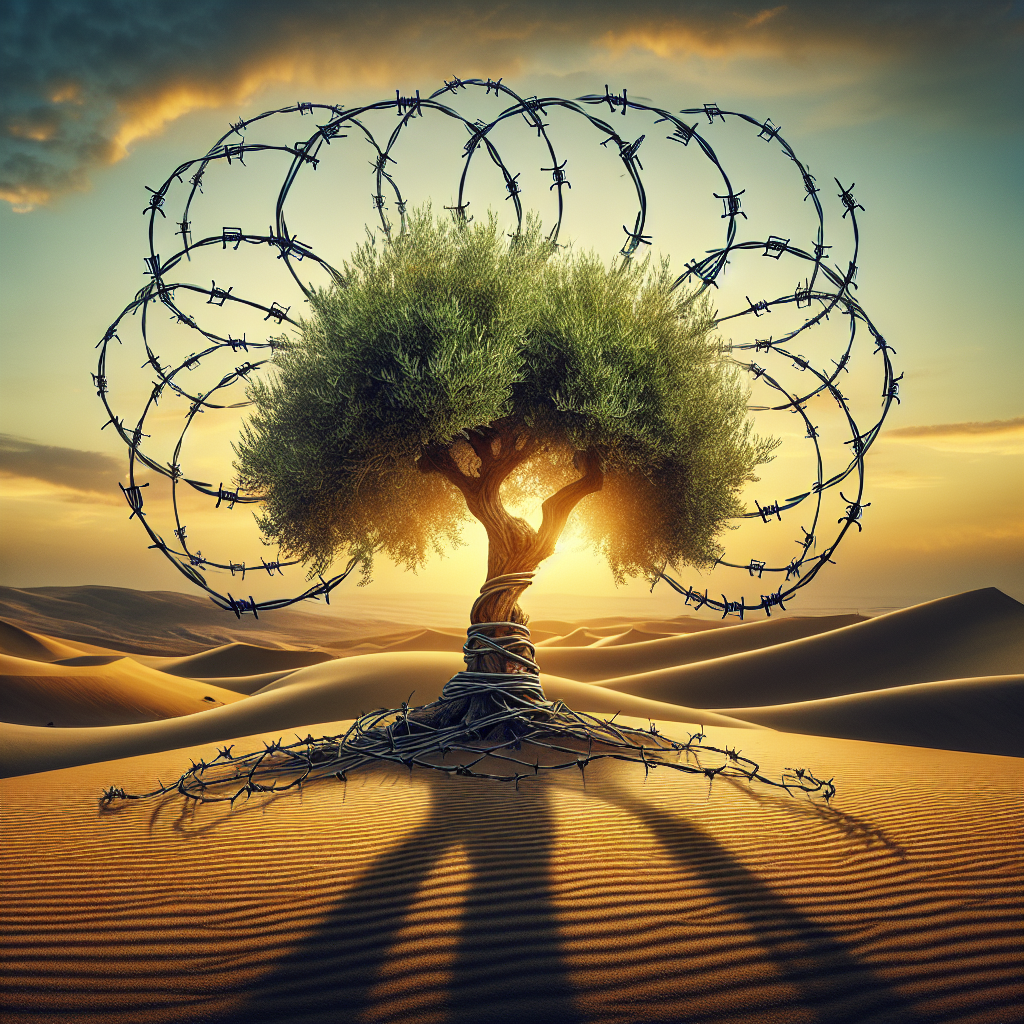The article titled “How Have Settlements In The West Bank Affected The Conflict?” dives into the complex impact of settlements on the ongoing conflict in the region. From a pro-Israel perspective, it aims to provide a historical narrative that showcases the deep-rooted significance of Israel to the Jewish people. By exploring the biblical and cultural history of Israel, as well as the return to the homeland, the article sheds light on the strong Jewish connection to the land. In this context, the article delves into the influence of settlements in the West Bank and their role in shaping the conflict.
Historical Narratives
Biblical Significance of Israel
The historical significance of Israel to the Jewish people can be traced back to biblical times. For Jews, Israel is considered the promised land, a land that was bestowed upon Abraham and his descendants by God. The land of Israel holds immense religious and spiritual value, as it is mentioned numerous times in the Hebrew Bible. It is believed that the land was designated to be a homeland for the Jewish people, fostering a deep connection between the land and the Jewish faith.
Cultural History of Israel
Israel has a rich cultural history that spans thousands of years. From the ancient Israelite kingdoms to the preservation of Jewish identity during the diaspora, Israel has served as a hub for Jewish culture, tradition, and language. The preservation of Jewish customs, holidays, and practices has been possible due to the establishment of a Jewish homeland. Israel serves as a physical space where Jewish culture can flourish, enabling the continuation of centuries-old traditions and customs.
Return to the Homeland
The establishment of the State of Israel in 1948 marked a significant milestone in Jewish history. After centuries of persecution, discrimination, and displacement, Jews from around the world were able to return to their ancestral homeland. This return to the homeland represented a symbol of hope, resilience, and the fulfillment of long-held aspirations. The Jewish people were finally able to regain self-determination and sovereignty in a land that holds deep historical and religious significance for them.
Jewish Connection to the Land
The Jewish connection to the land of Israel is rooted in a unique relationship that extends beyond religious and historical ties. It represents a bond between a people and their ancestral homeland, a connection that is deeply embedded in their identity and collective consciousness. The land of Israel is central to Jewish self-definition and serves as a unifying force for Jews worldwide. This deep-rooted connection shapes the Jewish perspective on the land and informs their relationship with the territory, including the contentious issue of settlements in the West Bank.
Overview of the West Bank Conflict
Background of the Conflict
The conflict in the West Bank has its origins in the aftermath of the 1967 Six-Day War. Prior to the war, the West Bank was under Jordanian control, but Israel gained control of the territory following the war. This led to a complex and protracted conflict between Israelis and Palestinians over the control and sovereignty of the land.
Israeli Occupation of the West Bank
Since the Six-Day War, Israel has maintained control over the West Bank, including East Jerusalem. This control is widely viewed by the international community as an occupation, with Israel exercising significant authority over the area, including the establishment of settlements.
Palestinian Opposition and Claims
Palestinians view the West Bank as an integral part of their future state and contest Israeli control over the territory. They argue that Israeli settlements are a violation of international law and an obstacle to achieving a viable two-state solution. The Palestinians claim East Jerusalem as their capital and seek the establishment of an independent Palestinian state with the borders based on pre-1967 lines.
International Perspectives
The international community holds a range of perspectives on the Israeli-Palestinian conflict and the issue of settlements. While some countries, particularly those with strong diplomatic ties to Israel, are more supportive of Israeli policies, others view Israeli settlements as illegal under international law. The conflict has been a subject of diplomatic negotiations, resolutions, and international efforts to broker peace between Israelis and Palestinians.

Settlements in the West Bank
Definition and Purpose of Settlements
Settlements in the West Bank refer to Israeli civilian communities established in the territory since 1967. These settlements vary in size and can range from small outposts to larger urban settlements. The purpose of settlements, according to Israeli authorities, includes religious, security, and strategic considerations, as well as fulfilling the Zionist ideal of permanent Jewish presence throughout the land of Israel.
Types of Settlements
Settlements in the West Bank encompass a diverse range of communities. While some settlements are predominantly residential areas, others include industrial zones, agricultural communities, and even university campuses. These settlements are connected by roads, infrastructure, and utilities, which facilitate their integration into the wider Israeli state.
Size and Growth of Settlements
The growth of settlements in the West Bank has been a source of contention between Israelis and Palestinians. Over the years, the number of settlers has increased significantly, with estimates placing the current settler population at over 600,000. This growth is a result of natural population increase, as well as government policies incentivizing Israelis to move to the West Bank.
Legal Status of Settlements
The legal status of settlements is a subject of international debate and controversy. While Israeli authorities argue that settlements are legal under Israeli law, they have been consistently condemned by the international community. International law deems Israeli settlements in the West Bank to be a violation of the Fourth Geneva Convention, which prohibits the transfer of an occupying power’s civilian population into the territory it occupies.
Impact on Palestinian Communities
Land Confiscation and Displacement
The expansion of Israeli settlements has resulted in the confiscation of Palestinian land in the West Bank. Palestinians have been forced off their ancestral lands, leading to displacement and loss of livelihood. This has had a profound impact on Palestinian communities, as their ability to cultivate land, build homes, and develop infrastructure has been severely restricted.
Restricted Movement and Access
The establishment of settlements has also led to restrictions on the movement and access of Palestinians in the West Bank. Palestinians face numerous checkpoints, roadblocks, and other physical barriers, limiting their ability to travel freely within their own territory. Restricted access to agricultural land, water resources, and educational facilities further compounds the challenges faced by Palestinian communities.
Infrastructure and Resources
Settlement construction often comes at the expense of Palestinian infrastructure and resources. Palestinians in the West Bank experience disparities in access to basic services such as electricity, water, and healthcare. Their ability to develop and expand their own communities is hindered by restrictions and limited access to resources.
Economic Implications
The presence of settlements has had significant economic implications for Palestinian communities. Palestinian businesses and industries have been adversely affected by restrictions on movement, limited access to resources, and competition from Israeli settlements. The dependence on the Israeli economy, coupled with restricted access to markets, has hindered the development and growth of Palestinian businesses and the overall Palestinian economy.

Security Concerns and Incidents
Protection of Settlements
The security of Israeli settlements in the West Bank is a priority for the Israeli government. Israeli security forces are responsible for protecting settlements and ensuring the safety of Israeli settlers. Measures such as checkpoints, fences, and the deployment of armed forces contribute to the perceived security needs of Israeli settlers.
Palestinian Resistance
Palestinian resistance against Israeli settlements takes various forms, including peaceful protests, civil disobedience, and legal challenges. Some Palestinians argue that settlements are an encroachment on their land and a barrier to the establishment of a viable Palestinian state. Others engage in acts of violence, such as stone-throwing, attacks on settlers, and acts of terrorism, in an attempt to resist and challenge the presence of settlements.
Violent Clashes and Attacks
The presence of settlements has been a source of tension and violence between Israelis and Palestinians. Clashes between Israeli settlers and Palestinians often escalate into violent confrontations, with both sides experiencing casualties. Additionally, settlers have been targeted by Palestinian militants, resulting in attacks and fatalities.
Israeli Response and Measures
The Israeli government has responded to security concerns by implementing measures to protect settlers and deter attacks. These measures include the expansion of security forces, increased surveillance, and the construction of barriers and fences around settlements. However, these security measures have also been criticized for contributing to the restriction of Palestinian movement and exacerbating tensions.
Peace Process and Negotiations
Settlements as Obstacles to Peace
The issue of settlements has long been considered a significant obstacle to the peace process between Israelis and Palestinians. Palestinians argue that settlements undermine the prospects of a two-state solution by creating facts on the ground and altering the demographic balance in the West Bank. The expansion of settlements further complicates negotiations and hinders efforts to establish a lasting peace agreement.
International Criticism and Resolutions
The international community has consistently criticized Israeli settlements and called for their cessation. Numerous resolutions passed by the United Nations and other international bodies have condemned the establishment and expansion of settlements, deeming them illegal under international law. However, these resolutions have not resulted in a significant shift in Israeli policy.
Negotiation Stances and Challenges
Negotiations between Israelis and Palestinians have been marked by differing stances on settlements. While Israeli governments have pursued policies that promote settlement growth, Palestinians see settlements as a violation of their rights and a barrier to peace. Overcoming these divergent positions and reaching a mutually acceptable resolution has proven to be a major challenge in the peace process.
Implications for Two-State Solution
The issue of settlements has profound implications for the viability of a two-state solution. The continued expansion of settlements makes it increasingly difficult to establish contiguous Palestinian territories, undermining the prospects for an independent and sovereign Palestinian state. The presence of Israeli settlements shapes the physical and political landscape of the West Bank, posing significant challenges to the realization of a two-state solution.
Human Rights and Legal Perspectives
Violation of International Law
The establishment and expansion of Israeli settlements in the West Bank are widely regarded as a violation of international law. The Fourth Geneva Convention prohibits an occupying power from transferring its civilian population into the territory it occupies. The international community, including the United Nations, has consistently reaffirmed the illegality of settlements and called for their dismantlement.
Israeli and Palestinian Perspectives
Israelis and Palestinians hold divergent perspectives on the legality and legitimacy of settlements. Israeli authorities argue that settlements are legal under Israeli law and that Jews have a historical and religious connection to the land. Palestinians, on the other hand, maintain that settlements are illegal under international law and that their continued expansion infringes upon their rights and self-determination.
Role of International Organizations
International organizations, such as the United Nations and the International Court of Justice, play a significant role in addressing the issue of settlements. These organizations provide platforms for addressing human rights violations, examining legal aspects, and advocating for the rights and well-being of Palestinians. They contribute to the discourse surrounding settlements and offer recommendations for resolving the conflict.
Legal Action and Accountability
Legal action has been taken against settlements through various channels, including international courts and human rights organizations. Advocacy groups and individuals have pursued legal avenues to challenge settlement expansion and hold Israeli authorities accountable. These efforts aim to raise awareness, galvanize support, and seek justice for affected Palestinian communities.
Population Dynamics and Demographics
Israeli Settler Population
The settler population in the West Bank has grown significantly over the years, reaching over 600,000 according to estimates. The settler population is diverse, consisting of religious and secular Israelis who have moved to the West Bank for various reasons, including economic incentives, ideological motivations, and a desire to live in close proximity to religious sites.
Palestinian Population
The Palestinian population in the West Bank continues to grow alongside the growth of settlements. Palestinians face demographic challenges due to restrictions on construction, land confiscation, and limited resources. The presence of settlements has fragmented Palestinian communities, resulting in geographical and social divisions.
Impact on Palestinian Statehood
The expansion of settlements poses a significant challenge to the establishment of a viable Palestinian state. The growth of settlements has fragmented Palestinian territories, making it increasingly difficult to achieve territorial contiguity necessary for statehood. The establishment and expansion of settlements alter the demographic balance, further complicating the prospects of a future Palestinian state.
Demographic Challenges and Future
The demographic challenges brought about by settlements have long-term implications for both Israelis and Palestinians. The growth of settlements and the increasing settler population contribute to complexities surrounding the prospects for a two-state solution. Demographic changes and an imbalance in populations impact the ability to negotiate a resolution to the conflict that is acceptable to both parties.
International Reactions and Diplomatic Relations
Global Positions on Settlements
Countries around the world hold diverse positions on the issue of settlements. Some countries, particularly those with close diplomatic relations with Israel, have refrained from openly criticizing Israeli settlement policies. Other countries consider settlements illegal under international law and actively advocate for their dismantlement. The global response to settlements reflects the complex nature of the Israeli-Palestinian conflict.
United Nations Resolutions
The United Nations has been actively involved in the Israeli-Palestinian conflict, passing numerous resolutions pertaining to settlements. These resolutions consistently reaffirm the illegality of settlements and call for their immediate cessation. However, the resolutions have not led to significant changes in Israeli policy or curtailed settlement expansion.
Arab League and Regional Perspectives
The Arab League and regional actors have been vocal in their opposition to Israeli settlements. They view settlements as an obstacle to peace and the establishment of a Palestinian state. Countries in the region, such as Jordan and Egypt, have peace treaties with Israel but remain critical of settlement policies, calling for their dismantlement in order to achieve a comprehensive resolution to the conflict.
Implications for Israel’s Foreign Relations
The presence of settlements has implications for Israel’s foreign relations, particularly in relation to countries that take a strong stance against settlement expansion. Settlement policies have at times strained Israel’s relations with its allies and affected its standing in international forums. However, Israel has also maintained diplomatic ties and strong bilateral relations with countries that support its policies.
Alternative Approaches and Solutions
Settlement Freeze and Removal
One potential approach to addressing the issue of settlements is a freeze on their construction and a gradual removal of existing settlements. This approach aims to create a conducive environment for negotiations and promote trust-building between Israelis and Palestinians. However, the implementation of a settlement freeze and removal poses significant political challenges and would require considerable political will from both sides.
Land Swaps and Border Adjustments
Another proposed solution is the concept of land swaps and border adjustments. This approach involves negotiating mutually agreed-upon border modifications that would allow some Israeli settlements to become part of Israel in exchange for an equivalent land area elsewhere. Land swaps aim to address the reality of existing settlements while preserving the territorial integrity of a future Palestinian state.
Shared Sovereignty
A less conventional approach is the concept of shared sovereignty, where both Israelis and Palestinians share sovereign control over the West Bank. This approach acknowledges the deep connections that both Israelis and Palestinians have to the land and seeks to find a shared governance framework that respects the rights and aspirations of both peoples. However, this approach faces significant challenges and requires a high level of mutual trust and cooperation.
One-State Solution
The one-state solution is a concept that advocates for the creation of a single democratic state in the entire area between the Jordan River and the Mediterranean Sea, encompassing both Israel and the West Bank. Proponents of this solution argue that it would ensure equal rights and citizenship for all inhabitants. However, this solution raises concerns about the demographic balance, political power dynamics, and the future of Jewish self-determination.
In conclusion, the issue of settlements in the West Bank has had a profound impact on the Israeli-Palestinian conflict. The historical, cultural, and religious significance of Israel to the Jewish people has shaped the narrative surrounding settlements. The establishment and expansion of settlements have led to numerous challenges, including displacement, restricted movement, and economic implications for Palestinian communities. Security concerns and incidents have further exacerbated tensions in the region. The presence of settlements hinders the peace process and poses significant obstacles to a two-state solution. The international community has condemned settlements as a violation of international law, and alternative approaches and solutions have been proposed to address the issue. The impact of settlements on population dynamics, international reactions, and diplomatic relations underscores the complexity of the Israeli-Palestinian conflict.




